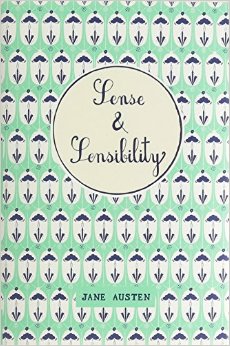Sense and Sensibility, by Jane Austen
Nov 30
2015

I have long owned the Mr. Boddington's Penguin Classics editions of Pride and Prejudice and Alice's Adventures in Wonderland, and both suffer from a major quality control issue: the ink periodically fades to near-invisibility. Still, I loved the Boddington books' cover art, so when their edition of Jane Austen's Sense and Sensibility popped up at my local discount department store, I decided to buy it—after flipping through it to check on the ink, of course.
Sense and Sensibility is my least favorite Jane Austen novel. The plot centers around two sisters: Elinor Dashwood, who is basically a saint, and her melodramatic younger sister Marianne, who is too busy being a free spirit to acknowledge that we live in a society. I have always found Sense and Sensibility less charming than Emma, Northanger Abbey, or Pride and Prejudice, less interesting than Mansfield Park, and less romantic than Persuasion. But even sub-par Jane Austen is obviously a thing of joy and beauty, and Sense and Sensibility features plenty of the author's trademark sly wit, biting social commentary, and succinct-yet-devastating character descriptions.
This edition includes two critical essays. One is the original Penguin Classics introduction by literary critic Tony Tanner, which I found both interesting and thought-provoking. The other is an essay by Oxford professor Ros Ballaster, and it is ridiculous. In addition to getting some basic facts about Sense and Sensibility and its author wrong (Lady Susan is not an unfinished novel; Eliza Williams is not a second child), Ms. Ballaster is prone to sentences like these:
Sense and Sensibility is my least favorite Jane Austen novel. The plot centers around two sisters: Elinor Dashwood, who is basically a saint, and her melodramatic younger sister Marianne, who is too busy being a free spirit to acknowledge that we live in a society. I have always found Sense and Sensibility less charming than Emma, Northanger Abbey, or Pride and Prejudice, less interesting than Mansfield Park, and less romantic than Persuasion. But even sub-par Jane Austen is obviously a thing of joy and beauty, and Sense and Sensibility features plenty of the author's trademark sly wit, biting social commentary, and succinct-yet-devastating character descriptions.
This edition includes two critical essays. One is the original Penguin Classics introduction by literary critic Tony Tanner, which I found both interesting and thought-provoking. The other is an essay by Oxford professor Ros Ballaster, and it is ridiculous. In addition to getting some basic facts about Sense and Sensibility and its author wrong (Lady Susan is not an unfinished novel; Eliza Williams is not a second child), Ms. Ballaster is prone to sentences like these:
"A relativistic terminology of comparatives and negatives asserts the security of positive and absolute essences. Ultimately, all that holds sense and sensibility in a productive tension, and prevents the collapse of their distinction, is no more than another linguistic variant on their common etymological root, the sentence."Um... sure? To be fair, Ballaster has a couple of good ideas buried in her very long, very wordy essay, but her style is too grandiloquent for anyone but the most dedicated Austen nerds (my people!) to slog through. Thankfully, it's not necessary to read her essay to appreciate Sense and Sensibility, but I frequently found myself wishing that some of the ink devoted to her overblown verbiage could have been spent making my copies of Pride and Prejudice and Alice actually, y'know, legible.
Posted by: Julianka
No new comments are allowed on this post.
Comments
No comments yet. Be the first!